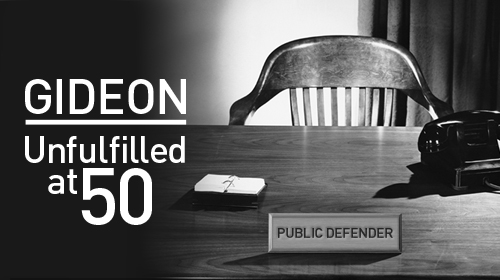
This was originally posted on .
Fifty years ago, 52-year old drifter Clarence Earl Gideon was prosecuted, convicted, and sentenced without a lawyer to five years imprisonment for stealing bottled drinks and vending machine coins from a pool hall in Panama City, Florida. Mr. Gideon's appeal of his conviction to the U.S. Supreme Court, written in pencil on lined prison stationery, led to a unanimous landmark ruling: poor defendants in criminal cases have a constitutional right to legal counsel even if they cannot afford it.
The American Civil Liberties Union supported Mr. Gideon by filing a friend of the court brief and working closely with Abe Fortas, a future Supreme Court Justice who argued the case.
Yet in the half-century since the decision, most states have fallen woefully short of the actual realization of what Justice Hugo L. Black called a "noble ideal." For millions of indigent defendants, Gideon's trumpet has remained silent. As Attorney General Holder has stated, "[t]he basic rights guaranteed under Gideon have yet to be realized. Millions of Americans still struggle to access the legal services that they need and deserve – and to which they are constitutionally entitled."
The two primary causes of this crisis are too little funding and too many cases. Nationwide, indigent defense services are drastically underfunded, preventing states from providing effective assistance of counsel, not to mention investigators and experts, and compound the difficulty of attracting qualified public defenders. Some counties in Pennsylvania, for example, spend only $3 or less per capita on indigent defense. Some states and counties award flat fee contracts to the lowest bidders – i.e., lawyers who will handle the most cases at the lowest costs.
In addition, as Attorney General Eric Holder has observed, 75 percent of public defender offices have crushing caseloads that prevent basic case investigations. For instance, in 2007 the Bureau of Justice Statistics found that 64 percent of indigent prisoners detained following arrest did not meet their lawyers until after at least one week later. In Louisiana and Mississippi, people detained after arraignments can languish for weeks, even months, in legal limbo, before meeting with their attorney or having anyone investigate their case. Excessive caseloads are in part a consequence of over-criminalization of low-level, non-violent activity. According to the National Center for State Courts, approximately 80 percent of state cases are misdemeanors.
The daily injustices suffered nationwide by indigent defendants are staggering. Many are without lawyers at bail hearings, which leaves people incarcerated until trial because they cannot afford bail. Overburdened or poorly trained lawyers fail to consult with clients, investigate pending charges, file critical motions, or adequately explain plea offers and their consequences. Simply put, too often life-changing events occur in the legal system in the absence of competent counsel.
But there are solutions to this shameful situation. States and the federal government must start by providing sufficient staff resources towards indigent defense and ensure market rate pay for public defenders. They also need to adopt adequate standards on workload, performance, and training, and make sure these standards are implemented by establishing a system of supervision and accountability for lawyers representing indigent clients.
To reach these goals, the ACLU and its affiliates are investigating or litigating in almost a dozen states, and also pressing state and federal governments to adopt smarter, data-driven criminal justice policies. These include diverting anyone arrested for minor, non-violent offenses from the criminal justice system into quality drug treatment programs, as well as decriminalizing certain low-level offenses such as marijuana possession altogether.
Clarence Gideon faced long odds when he sought relief from the Supreme Court. But the power of his argument – just as much now as then – transcended his informal presentation, leading Justice Black to declare that the right of every indigent defendant to stand equal before the law "cannot be realized if the poor man charged with crime has to face his accusers without a lawyer to assist him."
Today's indigent defense crisis has turned on its head the court's declaration that "lawyers in criminal courts are necessities, not luxuries." It is imperative that states and the federal government uphold the constitutional principles "established to achieve a fair system of justice" that Clarence Gideon fought for 50 years ago.
Learn more about criminal law reform and other civil liberty issues: Sign up for breaking news alerts, , and .


